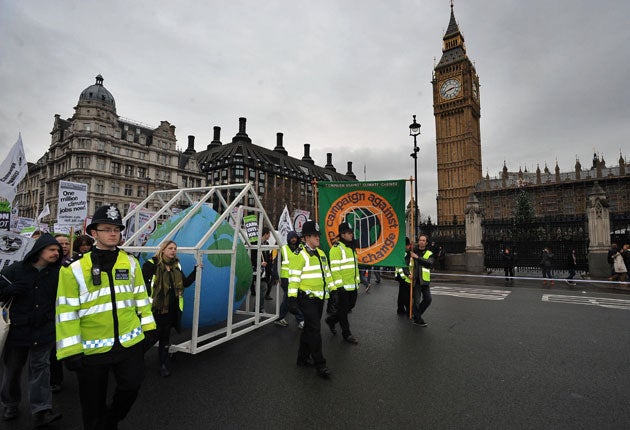Climate talks on knife edge over Chinese demands
Developing nations accuse West of intransigence, as corruption is cited as obstacle to progress

Environment ministers from around the world flew in to Mexico yesterday for the final days of the climate-change talks in Cancun, which threatened to fracture over Chinese-led demands for concessions from the West. Campaigners marched in London yesterday to demand action.
As a sign of the work still to be done, only 170 words out of 1,300 on two pages of a key text were undisputed on the "shared vision" of what delegates hoped to accomplish.
However, a further issue is now being cited as a significant obstacle in the fight against climate change – corruption.
The extent of the problem could see any agreements doomed to failure, according to leading global risks analysts. New research to be released this week shows that among the countries most at risk from climate change are also to be found those that are most corrupt – making it difficult to counter the effects of flooding, desertification and deforestation.
"Our mapping research shows that the countries which are most vulnerable to the impacts of climate change are often those that are the most corrupt," said Professor Alyson Warhurst, chief executive of global risk analysts Maplecroft, which will release its Business Integrity and Corruption Index this Thursday.
She warned that endemic corruption "results in money being diverted away from critical infrastructure projects and towards personal gain of individuals", adding that schemes to combat climate change are at particular risk of being compromised.
Generally, bribery is more prevalent in developing economies with weak legal systems and low pay scales, meaning both that there is a greater temptation to engage in corruption and it is easier to do so with impunity. Of the world's leading emerging markets of Brazil, Russia, India and China, Russia is cited as the most corrupt due to the "systemic nature of corruption in the country and its prevalence throughout all tiers of government". India is categorised as an "extreme risk" country, while China and Brazil are labelled as being at "high risk" of corruption. Mexico, Saudi Arabia and South Africa are among the other countries that fall into this category. Bangladesh, Nigeria and Pakistan are among those deemed at "extreme risk".
The findings come as the outcome of the Cancun negotiations, which end this Friday, are "in the balance", according to Todd Stern, head of the US delegation. And the mood among delegates will not have been lifted by the news yesterday that the talks had been dismissed as doomed to failure by the European Council President, Herman Van Rompuy, according to a leaked US embassy cable. The document, recording a discussion last December between Mr Van Rompuy and the US ambassador to Belgium, claimed the EC President said he had "given up" on the negotiations.
The chances of any deals being struck this week are remote, with a continuing row over the future of the Kyoto protocol, which expires in 2012. In essence, representatives of developing countries want it to be extended, while rich countries do not. Existing tensions were exacerbated on Friday by China's accusation that Western countries were trying to "kill off" the protocol signed 13 years ago, which obliges only developed nations to cut greenhouse gas emissions.
Amid growing anger at the lack of political action, several thousand people marched to Parliament in London yesterday to demand that Britain become "zero carbon" by 2030.
Join our commenting forum
Join thought-provoking conversations, follow other Independent readers and see their replies
0Comments